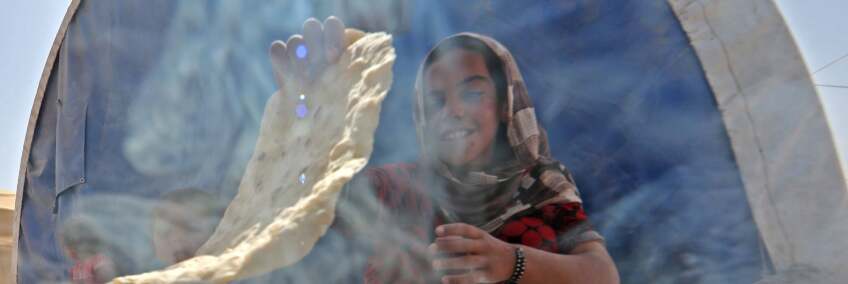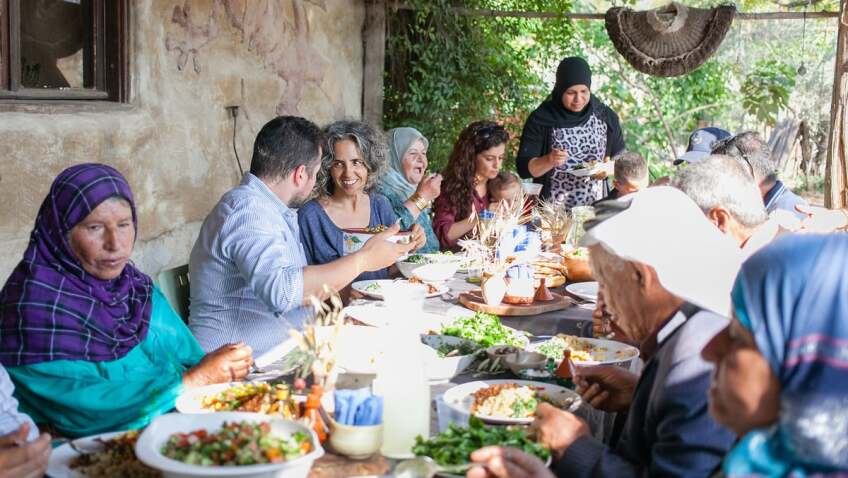Breaking Bread: Food in Times of War

I question travelers
From the four corners of the earth
Hoping to meet one
Who has breathed your fragrance.
—“Absence,” Abu Bakr al-Turtushi
A few years ago, in October 2014, I was invited to give a talk at a literary festival at Old Dominion University in Norfolk, Virginia. The title of the festival was “The Hungry Heart is Telling You.” It was about food and literature, but also, as one of the co-directors put it, “those deeper kinds of sustenance that we seek.” They asked me because I had written a book about food and war in Beirut and Baghdad.
The day of the talk, I got an email from someone I didn’t know. His name was Rudolfo. “I am currently a medic in the Army and have spent a considerable amount of time in Iraq,” he wrote. He had seen the announcement for the festival, and that led him to my articles from Iraq, “and as expected, many things from my past were conjured up by them.” He added that he was crying as he wrote the email, and added, in closing, “I was always taught that Soldiers aren't supposed to cry.”
I planned to talk about books and poetry, and how important they are to everyday life in Baghdad, and also the old Iraqi tradition of writing poems about wine. All of these seemed like good topics for a literary festival. Anti-Muslim hatred was already beginning to poison our country; I wanted to tell an American audience some things they probably didn’t know about the place we’d invaded and the people who lived there. But when I got Rudolfo’s email, I decided, at the last minute, to add something else just for him.
I was in Baghdad in 2003 and 2004. Even then, American editors mostly wanted stories about how this war, which was taking place in Iraq, would affect Americans. Even when they let you write stories about Iraqis, you still had to filter them through the prism of U.S. foreign policy, or the American military, and whether the war was bad or good. Right-wing news outlets wanted stories that made the military look good; left-wing news outlets wanted stories that made the military look bad. Both of these views were profoundly beside the point. So I decided I would write about Iraqi civilians instead, and how the war was affecting them. The result was that I hardly met anyone from the military during the time I was in Baghdad.
But I did meet Alan King. During Operation Iraqi Freedom, which is what the U.S. military called the war, he was head of the 422nd Civil Affairs Battalion and the senior civil-military advisor to the 3rd Infantry Division. A big part of Alan’s job was to build relationships between the U.S. military and the local population. He spent a lot of time in meetings, and sitting around in tents and eating Iraqi food. Of him, I wrote in my book, “Day of Honey: A Memoir of Food, Love and War”:
But one of the most important acts of diplomacy an American soldier could perform, as Alan soon discovered, was simply to eat. Eat the sheep a tribal sheikh has slaughtered. Eat mountains of rice scooped up with three fingers. Eat gobbets of fat with relish, and not a moment’s hesitation, because your host would normally save this delicacy for himself and he is offering it to you <i>min eedu</i>, from his hand. Eat sitting at tables in gilded overstuffed dining room chairs, reclining on cushions in a diwan, or kneeling on a concrete floor around a sheet of plastic weighed down with bowls of kubba. The path to hearts and minds led through the stomach. You have to eat the meal

Most of the Iraqis I know have shared food with American servicemembers at one point or another. My friend Harith met a soldier in a stationery store during the early days of the invasion, when they could just walk into a store and buy things. The Iraqis in the store were joking in Arabic about the soldier’s dark skin. Although he didn’t know Arabic, the soldier could tell they were laughing at him. “Sir, those people are afraid of the future,” Harith told the soldier, whose name was Pepe. “I have been thinking of these issues myself right before your arrival. Sir, we all feel worried.”
The next day, Harith went into the kitchen with his aunt and her sons. The family all prepared an Iraqi feast for Pepe: ground bulgur wheat stuffed with meat and onions and spices, fried kebab and Iraqi biryani, which is rice with meatballs, almonds, french-fries, and currants. Harith brought it to the police station where Pepe and his unit were based, and they ate the whole thing. Later, when Harith’s brother went missing, Pepe helped the family track him down; he’d been picked up for driving after curfew and detained. “Pepe left two months later,” Harith wrote, “leaving an everlasting feeling that humanity is beyond politics, beyond the hideous and despicable wars, and beyond the revulsion and detestation caused by the sense of enmity people have for each other in wars.”
Much later in the war, after things had gone irreparably bad, two American soldiers showed up at another friend’s house. They came to search for insurgents, or caches of arms or weapons of mass destruction. They found posters of BB King and a vintage vinyl collection of Louis Armstrong. My friend Oday’s mother served them coffee, just as if they were real visitors she had invited into her home. “I’m not particularly happy about this,” she told her sons, in Arabic, while she was brewing the coffee. “But they’re guests in our house.” To me, that summed up the civilian experience of occupation: your visitors may not have realized they are uninvited, or even that they were guests. But treating them with hospitality was one way to take back your dignity, by recognizing yourselves as hosts.

The night of the conference, in Virginia, I read a couple of pages from my book about Alan King. Before I started, I told the audience that this was for the person who had reached out to me that morning. I had no idea if he was there or not. But after the talk, a man came up to the table where I was signing books. I knew as soon as I saw him that he was the person who had sent me the email. I was supposed to go out to a bar with a crew of poets after the festival. I invited him to come with us.
It was a warm fall night, and we sat outside the bar. I ended up talking to Rudolfo the whole time, while the poets hovered around us with friendly, uncomprehending enthusiasm. “You should be a writer, man,” said one of the poets to Rudolfo, and I agreed. He has the skill of describing without euphemism, with the precision and clarity of a surgeon, like when he talked about the violence he’d seen on his tour in Iraq. That, too, reminded me of Iraq, where every doctor and engineer seems to also be a poet or a painter or an artist of some kind. But lots of things remind me of Iraq.
We talked for four hours that night, maybe five. He’d been there a few later than I had, in 2006 and 2007, at the height of the civil war. He was based around Route Fatboy, the highway south of Baghdad. The violence between Iraqis and the US military was high. So was the violence between Iraqis and Iraqis. He’d been in the very worst place at the very worst time. He was one of the ones who’d had his tour extended. He ended up being there for fifteen months. His story was not that different from the stories I’d been hearing from Iraqis for years: of seeing close friends die violently, often right in front of them. And then having to keep on doing their jobs, and somehow getting through their daily lives, while carrying the weight of unimaginable grief and loss and survivor’s guilt as everything fell apart around them.
But he wanted to remember the lushness of the countryside: the green oases. The little villages south of Baghdad, where donkeys plodded along dirt roads and palm trees grew along irrigation canals. “I want to come back someday,” he said, “and see this country at peace.” When he got back from his deployment, he had his boots and his uniform sealed in plastic so that he would never lose the smell of Iraq.
The minute he said that, I could smell it: diesel fuel and jasmine, raw sewage and crude oil and orange blossoms. The little neighborhood bakeries that made samoun, the diamond-shaped bread for stuffing with cheese or meat, and khubz at-tannour, flatbread slapped on the insides of a tandoor oven, and the thousand and one other kinds of Iraqi bread; the sweet shops, like Abu Afif, that made baklava, and dates stuffed with almonds and walnuts, where a man once told me that to this day he could never bear to eat Iraqi dates, which are the best dates in the world. When I asked him why, he said it was because he had to live on them at one particularly bad point during his compulsory military service during the Iran-Iraq war. The Armenian baker in Karrada Dakhil, above the juice shop, who made the best maamoul cookies, with powdered sugar and pistachio and a whisper of cinnamon, who was desperate to leave the country for fear of being kidnapped and killed, because the kidnappers assumed all Christians were rich. The smell of roasting lamb and burning tires and mountains of garbage rotting in the sun.

I stayed in touch with Rudolfo sporadically over the next three years. The last time, he was about to finish his nursing degree and thinking of going on to medical school. “It is filled with lots of joy and favor but also a lot of sleepless nights due to anxiety,” he wrote. “I have been getting back to taking care of patients and I truly believe that is my calling. Nothing makes me happier than seeing someone at their worst getting better because of the care that I provide.”
When I asked him if he’d ever shared food with Iraqis during his fifteen months in Iraq, this is what he wrote:
First off, I don’t think that I put too much thought into the idea of how food can change the view of the perceived enemy. However, this does strike a chord with me. Every instance that I can think of from my experience in Iraq about food brings things back to Maslow’s hierarchy of needs. It was difficult for me sometimes to view the civilian population in a positive light especially after experiencing attacks or IEDs.<br> <br> It’s actually pretty amazing to reflect. In my current state, I have been able to re-explore my experiences in Iraq (after years of therapy). I think that there is something to be said about the five senses and how they can truly impact the mental health of someone. I do remember discussing things with you about sounds and smells and wanting so badly to never forget those things (although some of those things remain triggers to PTSD and nightmares).<br> <br> But I do remember some positive things when I am triggered. All my “local” food experiences are linked to positive experiences. For instance, I remember sitting in a static overwatch position for about eight hours dreading the last four hours and remembering how tired, scared and hungry I was as the sun was beginning to rise. I remember noticing the activity around starting to pick up. The locals were getting up from their night of sleep and they were beginning their days. I remember hearing voices of young children after being awoken.<br> <br> Smoke started rising in the air and I could smell them cooking bread. I’ll never forget that smell. Then after about an hour of my stomach turning from being stimulated by the smells of something other than MREs, a pair of children approached our Humvee with a tray of bread, cucumbers, tomatoes, and home-made cheese. I remember being so grateful that I didn’t have to eat MREs. Everyone in our vehicle scarfed down the meal as if we hadn’t eaten for days.<br> <br> In those moments, I didn’t feel tired, scared, or hungry even though I was sitting in an area that had been deemed one of the more active sites for IED activity. Just thinking about it brings a feeling of sadness because it is moments like this that reminds me that not all the Iraqis were our enemy.<br> <br> I think there is something to be said about this and I’m excited that someone is willing to explore this more. As a soldier, I think that I can focus most of my attention and memories on the negatives. As a caregiver and medical professional, it is easier for me to see the psychological effects of meeting the most basic needs. I would love to share my experiences as this has become a way for me to deal with the demons that hide deep within me.<br> <br> It is moments like this that reminds me that not all the Iraqis were our enemy.
They say the smell of incense can create a link to the spirit world. The original holy smoke carried prayers up to God. I’ve come to think of these moments when people share food as a prayer to a world that doesn’t quite exist yet, except in these fleeting moments. Despite all he had been through, Rudolfo still held on to his desire to see an Iraq where he didn’t have to be the enemy. The only time he got to inhabit that world was this meal: one small accidental breakfast, a five-minute truce in a war that’s been going on, in one form or another, for almost fifteen years.
I don’t know if I still believe what I wrote about Alan King. Food alone cannot make that world a reality. But what it can do is give us the faintest intimation that another world exists alongside this one — the slightest intangible sense, like déja vu. A barely perceptible sensory tug that tells us there is something that is entirely different from what we are seeing and hearing. It fades immediately, like a dream upon waking. But it lingers at the edge of consciousness, elusive, yet unforgettable, like the scent of bread baking at dawn.








